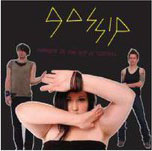Modern Anthem 001 Charting The Songs We Love So Well
Ten years ago, ‘Standing In The Way Of Control’ became a mega-hit, turning queer-underground American rockers Gossip, and lead singer Beth Ditto into mainstream stars. It’s a queer anthem that’s more relevant than ever, says
Conor Behan.
The rock band with the self-assured frontwoman is often a bright spot in the hyper male rock world. From Blondie’s Debbie Harry to Shirley Manson in Garbage, these are stars that often give queer music fans a starting point to find themselves.
Then there’s Gossip with its out and proud queer front-woman Beth Ditto, who this month finally releases her debut solo album, Fake Sugar. Her time in Gossip has cemented her legacy. In 2006 Gossip’s track ‘Standing in the Way of Control’ turned the band into stars, but what makes the song such a queer classic? And does the track have a legacy in an era where ‘resist’ is the new buzzword?
Gossip formed in Washington in 1999 and over the next five years released two albums (That’s Not What I Heard and Movement), independently building an underground following, touring with acts like Sleater Kinney and being remixed by queer faves Le Tigre. 2006 saw them release their third album Standing in the Way of Control, the title track of which would go on to propel them to mainstream success in Europe, particularly the UK.

That year, indie rock was enjoying huge success, thanks to acts like Razorlight and the Arctic Monkeys. Gossip caught the ears of music fans when the Soulwax remix of ‘Standing in the Way of Control’ was attached to the trailer for E4’s teen drama, Skins. The pulsating remix scored a visual of hedonistic kids at a house party. It was raw, shocking and gained plenty of notice. An adjacent release of the track made a decent dent on the charts, but a re-issue in early 2007 propelled it into a legitimate chart hit, the song landing in the UK top 10 (and the Irish top 30), with the album enjoying similar success.
Unlike the largely white, largely male-skewing indie acts at the time, Gossip came with an unapologetically queer message that made them a hit with LGBT audiences. Front-woman Beth Ditto declared herself a “fat feminist lesbian,” while drummer Hannah Billie was also an out lesbian. The subject matter of the song was intensely personal, focused on the fight for marriage equality in the US. Ditto told Remix magazine in 2007: “Nobody in the States was that surprised or shocked by what Bush did,” referring to the Federal Marriage Arrangement, which attempted to define marriage as solely between a man and a woman, “but it made everyone I know feel helpless and cheated. I wrote the chorus to try and encourage people not to give up.”
I was 23 when I wrote this. It’s now more relevant than ever. We got too comfortable, but I’m glad everyone’s awake now.
Ditto saw the song as a kind of activism, telling Spin magazine: “It was hard enough for me to get behind Bands Against Bush. It wasn’t the kind of activism I wanted to do. I didn’t feel like it was enough. Instead I decided to make a record about people feeling powerlfess and trying to empower them.”
As a call to arms it had an undeniable impact as both a popular mainstream hit and a song designed to make you sweat on the dancefloor. In fact, the mainstream pull of the song appealed to the band with Ditto telling Clash magazine in 2009: “It’s also nice to know that people are mindlessly dancing to a song like that, especially straight jocks. I love that idea. I think that’s the beauty of music – it’s different for everybody. It might just be a song that was on Skins, but then it might be a song that somebody’s like: ‘Oh yeah, this is a really sweet song’. I think that’s really nice.”
Gossip slid into the same orbit as the big ticket indie bands at the time by combining queer influences as disparate as Slyvester and Siouxsie Soux into a track that owed a debt to both disco and riot grrrl. The media took notice, not least of Ditto who was feted by NME and the fashion world, and was photographed partying with new pal Kate Moss.
Two other albums (Music for Men and A Joyful Noise) followed, but last year Ditto confirmed Gossip had parted ways. In the meantime, the appeal of ‘Standing in the Way of Control’ has not diminished. At solo show in London last month, Ditto said of the song: “I was 23 when I wrote this. It’s now more relevant than ever. We got too comfortable, but I’m glad everyone’s awake now.”
The Verdict
Beth’s solo debut
Having grown up in the American South, Beth Ditto came of age during her time with queer faves Gossip, a band she joined in 1999 and stayed with until last year. Her formative experiences as a queer woman in this world are all over her debut solo album, Fake Sugar. Gleefully unconcerned with seeming cool or current, Ditto offers up a grab-bag of pop that’s held together by her spectacular voice.
There’s the down-home Southern influence on ‘In and Out’, a swaggering soulful romp, while opening track, ‘Fire’ could easily have featured on a Gossip album. ‘We Could Run’ has an earnest, U2-style stadium rock sheen, while ‘Love in Real Life’ features a hushed, ethereal quality that Ditto nails. Both a breakup record about leaving the band that formed you and a document of the trials in her marriage, Fake Sugar is a powerful mix of blues and rock influences with a pop sheen that’s both a reminder of both Ditto’s vocal skills and her ability to tell stories through song. It’s an unaploegtically queer album brought to life in a way that will resonate with everyone.